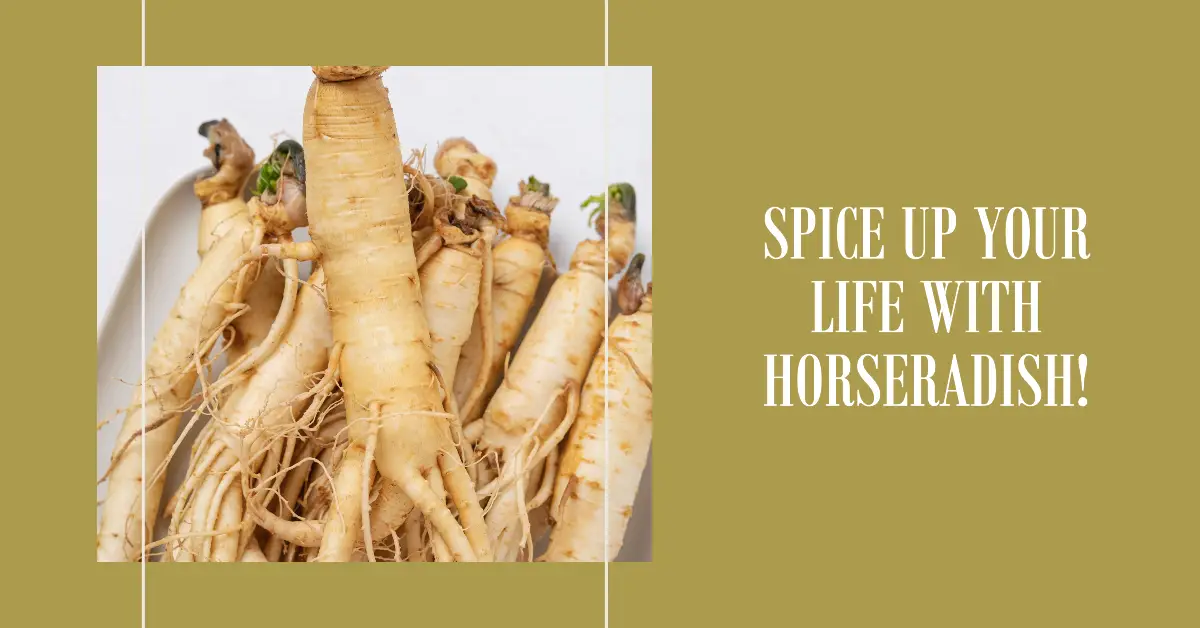
Horseradish is a root vegetable that is known for its sharp, pungent flavor. It is a popular condiment in many cuisines, but it also has a number of potential health benefits.

Horseradish is a good source of vitamins and minerals, including:
- Vitamin C: Vitamin C is essential for a healthy immune system. It helps to produce white blood cells, which fight infection.
- Potassium: Potassium is an important mineral that helps to regulate blood pressure and fluid balance.
- Calcium: Calcium is essential for strong bones and teeth.
- Magnesium: Magnesium is a mineral that plays a role in many bodily functions, including muscle contraction, nerve function, and blood sugar control.
- Copper: Copper is a mineral that is essential for the production of red blood cells and collagen.
- Manganese: Manganese is a mineral that is important for bone health, brain function, and metabolism.
- Iron: Iron is a mineral that is essential for carrying oxygen throughout the body.
- Dietary fiber: Dietary fiber helps to keep the digestive system healthy and can also help to promote feelings of fullness.
Horseradish is also a good source of antioxidants, which can help to protect the body from damage caused by free radicals. Free radicals are unstable molecules that can damage cells and contribute to the development of chronic diseases.
Some of the potential health benefits of horseradish include:
- Boosting the immune system: Horseradish contains vitamin C, which is essential for a healthy immune system. Vitamin C helps to produce white blood cells, which fight infection.
- Improving digestion: Horseradish contains dietary fiber, which helps to keep the digestive system healthy. Fiber also helps to promote feelings of fullness, which can be helpful for weight loss.
- Reducing inflammation: Horseradish contains compounds that have anti-inflammatory properties. Inflammation is a major risk factor for many chronic diseases, such as heart disease, cancer, and arthritis.
- Fighting cancer: Horseradish contains compounds that have been shown to have anti-cancer properties in laboratory studies. More research is needed to confirm these findings in humans.
- Detoxifying the body: Horseradish contains compounds that can help to detoxify the body by eliminating harmful toxins.
How to use horseradish
Horseradish can be used fresh, grated, or dried. It is often used as a condiment for meats, fish, and vegetables. Horseradish can also be added to sauces, dressings, and dips.
When using fresh horseradish, be careful to avoid contact with your eyes and skin. The fumes from horseradish can be irritating.
Here are some tips for using horseradish in your cooking:
- Add a small amount of grated horseradish to mayonnaise or sour cream for a delicious dip or sauce.
- Mix grated horseradish with ketchup or mustard for a flavorful burger condiment.
- Add a spoonful of grated horseradish to your favorite salad dressing for a spicy kick.
- Top your favorite grilled fish or chicken dish with a dollop of horseradish sauce.
- Add a small amount of grated horseradish to your favorite soup or stew for extra flavor.
- Use horseradish as a marinade for meats, fish, or vegetables.
Conclusion
Horseradish is a versatile and flavorful root vegetable with a number of potential health benefits. It can be enjoyed as a condiment, added to sauces and dressings, or used as a marinade. If you are looking for a healthy and delicious way to add flavor to your food, horseradish is a great option.




